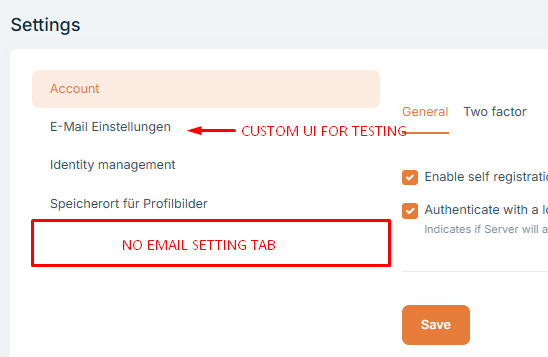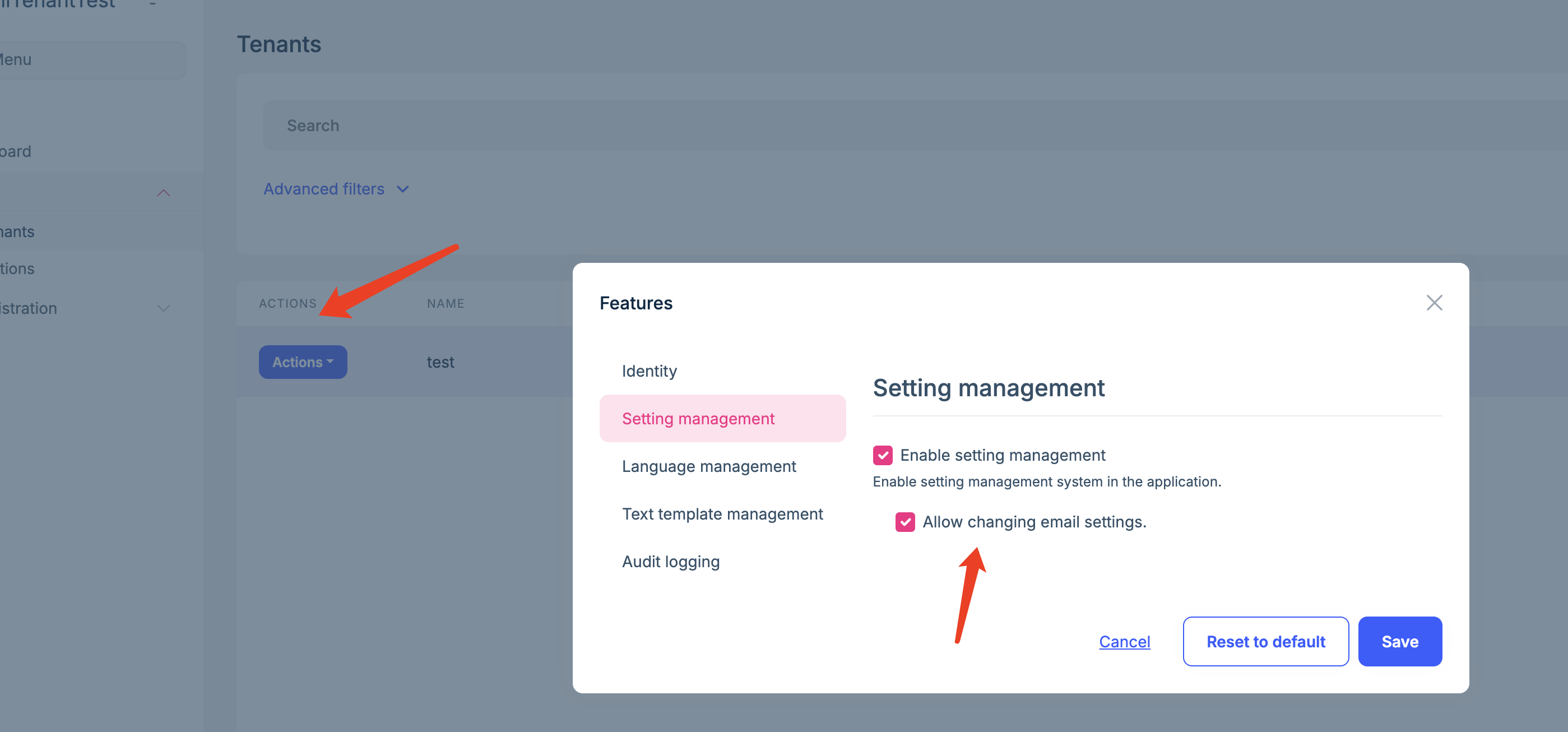ABP Framework version: v8.1.4 UI type: Blazor Server DB provider: PostgresSQL Tiered: yes
I found a similar post, but it's three years old, and the suggested code changes didn't help.: https://abp.io/support/questions/1622/Email-settings-not-visible-for-tenant
Steps to reproduce the issue:
- Give a Tenant the Permission to Edit/Create his own E-Mail Settings. (We need this functionality because our future clients will need to add their own SMTP settings.)
I basically copied the code that liangshiwei provided in his old answer, i implemented the service and tested it on the Host Side and it works fine, i also edited the Permission:
public class YourProjectNamePermissionDefinitionProvider : PermissionDefinitionProvider
{
public override void Define(IPermissionDefinitionContext context)
{
......
var settingManagement = context.GetPermissionOrNull(SettingManagementPermissions.Emailing);
settingManagement.MultiTenancySide = MultiTenancySides.Both;
.....
}
.....
}
 But when im on a tenant as an admin, I do not have the option to grant permission for the email settings, there is no checkbox. Is the old method outdated? If so, what is a better method to do this?
But when im on a tenant as an admin, I do not have the option to grant permission for the email settings, there is no checkbox. Is the old method outdated? If so, what is a better method to do this?

I also tried creating my own Setting-UI just to check if i could enter and im getting this Error:
2024-07-26 17:16:53.806 +02:00 [INF] Executing endpoint 'Volo.Abp.SettingManagement.EmailSettingsController.GetAsync (Volo.Abp.SettingManagement.HttpApi)' 2024-07-26 17:16:53.808 +02:00 [INF] Route matched with {area = "settingManagement", action = "Get", controller = "EmailSettings", page = ""}. Executing controller action with signature System.Threading.Tasks.Task`1[Volo.Abp.SettingManagement.EmailSettingsDto] GetAsync() on controller Volo.Abp.SettingManagement.EmailSettingsController (Volo.Abp.SettingManagement.HttpApi).
2024-07-26 17:16:53.850 +02:00 [INF] Authorization failed. These requirements were not met:
PermissionRequirement: SettingManagement.Emailing
2024-07-26 17:16:53.864 +02:00 [WRN] ---------- RemoteServiceErrorInfo ----------
{
"code": "Volo.Authorization:010001",
"message": "Autorisation fehlgeschlagen! Die entsprechende Richtlinie wurde nicht erfüllt.",
"details": null,
"data": {},
"validationErrors": null
}
2024-07-26 17:16:53.864 +02:00 [WRN] Exception of type 'Volo.Abp.Authorization.AbpAuthorizationException' was thrown.
Volo.Abp.Authorization.AbpAuthorizationException: Exception of type 'Volo.Abp.Authorization.AbpAuthorizationException' was thrown.
at Microsoft.AspNetCore.Authorization.AbpAuthorizationServiceExtensions.CheckAsync(IAuthorizationService authorizationService, AuthorizationPolicy policy)
at Volo.Abp.Authorization.MethodInvocationAuthorizationService.CheckAsync(MethodInvocationAuthorizationContext context)
at Volo.Abp.Authorization.AuthorizationInterceptor.AuthorizeAsync(IAbpMethodInvocation invocation)
at Volo.Abp.Authorization.AuthorizationInterceptor.InterceptAsync(IAbpMethodInvocation invocation)
at Volo.Abp.Castle.DynamicProxy.CastleAsyncAbpInterceptorAdapter`1.InterceptAsync[TResult](IInvocation invocation, IInvocationProceedInfo proceedInfo, Func`3 proceed)
at Castle\.DynamicProxy\.AsyncInterceptorBase\.ProceedAsynchronous\[TResult\]\(IInvocation invocation\, IInvocationProceedInfo proceedInfo\)
at Volo.Abp.Castle.DynamicProxy.CastleAbpMethodInvocationAdapterWithReturnValue`1.ProceedAsync() at Volo.Abp.GlobalFeatures.GlobalFeatureInterceptor.InterceptAsync(IAbpMethodInvocation invocation) at Volo.Abp.Castle.DynamicProxy.CastleAsyncAbpInterceptorAdapter`1.InterceptAsync[TResult](IInvocation invocation, IInvocationProceedInfo proceedInfo, Func`3 proceed) at Castle.DynamicProxy.AsyncInterceptorBase.ProceedAsynchronous[TResult](IInvocation invocation, IInvocationProceedInfo proceedInfo) at Volo.Abp.Castle.DynamicProxy.CastleAbpMethodInvocationAdapterWithReturnValue`1.ProceedAsync()
at Volo.Abp.Auditing.AuditingInterceptor.ProceedByLoggingAsync(IAbpMethodInvocation invocation, AbpAuditingOptions options, IAuditingHelper auditingHelper, IAuditLogScope auditLogScope)
at Volo.Abp.Auditing.AuditingInterceptor.InterceptAsync(IAbpMethodInvocation invocation)
at Volo.Abp.Castle.DynamicProxy.CastleAsyncAbpInterceptorAdapter`1.InterceptAsync[TResult](IInvocation invocation, IInvocationProceedInfo proceedInfo, Func`3 proceed)
at Castle\.DynamicProxy\.AsyncInterceptorBase\.ProceedAsynchronous\[TResult\]\(IInvocation invocation\, IInvocationProceedInfo proceedInfo\)
at Volo.Abp.Castle.DynamicProxy.CastleAbpMethodInvocationAdapterWithReturnValue`1.ProceedAsync() at Volo.Abp.Validation.ValidationInterceptor.InterceptAsync(IAbpMethodInvocation invocation) at Volo.Abp.Castle.DynamicProxy.CastleAsyncAbpInterceptorAdapter`1.InterceptAsync[TResult](IInvocation invocation, IInvocationProceedInfo proceedInfo, Func`3 proceed) at Castle.DynamicProxy.AsyncInterceptorBase.ProceedAsynchronous[TResult](IInvocation invocation, IInvocationProceedInfo proceedInfo) at Volo.Abp.Castle.DynamicProxy.CastleAbpMethodInvocationAdapterWithReturnValue`1.ProceedAsync()
at Volo.Abp.Uow.UnitOfWorkInterceptor.InterceptAsync(IAbpMethodInvocation invocation)
at Volo.Abp.Castle.DynamicProxy.CastleAsyncAbpInterceptorAdapter`1.InterceptAsync[TResult](IInvocation invocation, IInvocationProceedInfo proceedInfo, Func`3 proceed)
at lambda\_method3516(Closure, Object)
at Microsoft.AspNetCore.Mvc.Infrastructure.ActionMethodExecutor.AwaitableObjectResultExecutor.Execute(ActionContext actionContext, IActionResultTypeMapper mapper, ObjectMethodExecutor executor, Object controller, Object[] arguments)
at Microsoft\.AspNetCore\.Mvc\.Infrastructure\.ControllerActionInvoker\.g\_\_Awaited\|12\_0\(ControllerActionInvoker invoker\, ValueTask`1 actionResultValueTask) at Microsoft.AspNetCore.Mvc.Infrastructure.ControllerActionInvoker.<InvokeNextActionFilterAsync>g__Awaited|10_0(ControllerActionInvoker invoker, Task lastTask, State next, Scope scope, Object state, Boolean isCompleted) at Microsoft.AspNetCore.Mvc.Infrastructure.ControllerActionInvoker.Rethrow(ActionExecutedContextSealed context) at Microsoft.AspNetCore.Mvc.Infrastructure.ControllerActionInvoker.Next(State& next, Scope& scope, Object& state, Boolean& isCompleted) at Microsoft.AspNetCore.Mvc.Infrastructure.ControllerActionInvoker.<InvokeInnerFilterAsync>g__Awaited|13_0(ControllerActionInvoker invoker, Task lastTask, State next, Scope scope, Object state, Boolean isCompleted) at Microsoft.AspNetCore.Mvc.Infrastructure.ResourceInvoker.<InvokeNextExceptionFilterAsync>g__Awaited|26_0(ResourceInvoker invoker, Task lastTask, State next, Scope scope, Object state, Boolean isCompleted) 2024-07-26 17:16:53.865 +02:00 [WRN] Code:Volo.Authorization:010001 2024-07-26 17:16:53.869 +02:00 [INF] AuthenticationScheme: Bearer was forbidden. 2024-07-26 17:16:53.869 +02:00 [INF] Executed action Volo.Abp.SettingManagement.EmailSettingsController.GetAsync (Volo.Abp.SettingManagement.HttpApi) in 61.7528ms 2024-07-26 17:16:53.870 +02:00 [INF] Executed endpoint 'Volo.Abp.SettingManagement.EmailSettingsController.GetAsync (Volo.Abp.SettingManagement.HttpApi)' 2024-07-26 17:16:54.057 +02:00 [DBG] Added 0 entity changes to the current audit log 2024-07-26 17:16:54.064 +02:00 [DBG] Added 0 entity changes to the current audit log 2024-07-26 17:16:54.065 +02:00 [INF] Request finished HTTP/1.1 GET https://localhost:44392/api/setting-management/emailing?api-version=1.0 - 403 null null 266.8626ms
6 Answer(s)
-
0
HI,
you can try clear the redis cache.
-
0
Hello, i tried clearing the cache multiple times and restarting but i did not change anything. I have still no access to email-settings or the option to give permission on tenant.
-
0
Hi,
could you please share a simple project to reproduce the problem? i will check it, thanks shiwei.liang@volosoft.com
-
0
I have sent the project via. WeTransfer.
The things i added are:
- your code from the 3 year old post
- my custom setting UI for testing MyEmailSettingService
-
0
-
0
Wow, it was a checkbox all along, anyways thank you!
































































